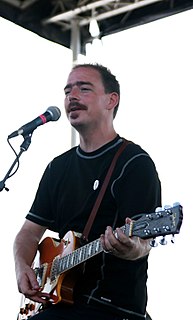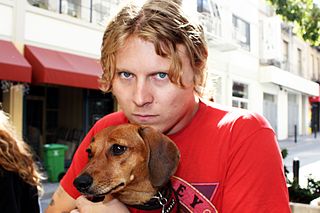A Quote by Eberhard Weber
Whenever I release a record, it's my record. It's not a selfish thought. I may work all year 'round for other people. So, finally, when I come out with my own album, it should be me with the creative help of other musicians.
Related Quotes
When I finally stopped [singing], he had been saying, like, the last day or so, he'd been saying, now, I think we should put this one in the album. So without him saying I want to record you and release an album, he kept - he started saying, let's put this one in the album. So the album, this big question, you know, began to take form, take shape. And Rick [Rubin] and I would weed out the songs.
I struggled with the pressure of having the successful record after the first record. Second album syndrome. I'm living proof; it's very real. It was like a psychological battle to be creative. I used to never feel pressure to be creative; it's always just been a fun thing. And then suddenly it's my job, and people are asking, 'Where's the record?'
I think I'm just trying to show a more mature side of the band and I think we've really come into the sound of our band. With every album we've grown, but I think this is just a really good picture of where we are right now and how we feel our music represents us. Under the thumb of other record companies we haven't had as much creative control and I think with this record we really did our own thing.
That one record changed everything for me. After Sgt. Pepper, it's the most influential record in the history of rock and roll. It affected Pink Floyd deeply, deeply, deeply. Philosophically, other albums may have been more important, like Lennon's first solo album. But sonically, the way the record's constructed, I think Music from Big Pink is fundamental to everything that happened after it.
That was an idea of the record company, and also that was my first album after MCA and we wanted to come back with a strong album that would be noticed. If we put the vocals by very talented people and very meaningful songs, then the vocals would be a platform so that I could be noticed again. All of the MCA albums were just loaded with problems -- you know, the right musicians, the engineers. The record company would say 'You have to make music for black radio, you can't do what you have been doing with The Crusaders.' Everybody was telling me that was over, finished, done.
You are unique, and there may be incidents in your experience that are more noble and praiseworthy in their way than those recorded in any other life. There may be a flash of illumination here and a story of faithfulness there; you should truthfully record your real self and not what other people may see in you.
At 13 years old, I realized I could start my own band. I could write my own song, I could record my own record. I could start my own label. I could release my own record. I could book my own shows. I could write and publish my own fanzine. I could silk-screen my own T-shirt. I could do this all myself.
I really like to think of each record as its own thing. So, for sure, but I hate the idea of being stuck in anything. Like I want to do a Hawkwind-style record too, or a noise rock record or a hardcore record. Why not, you know? I would just not want to keep heading too far in one direction, without pulling off and going the other way. That is what is fun for me.
In my opinion, I would still like to go into a studio - because I love the environment of being in a studio - and record a great album beginning to end, but then maybe not release it as an album. Maybe put singles out there, put songs out there - either give some away or release some the traditional way.




































